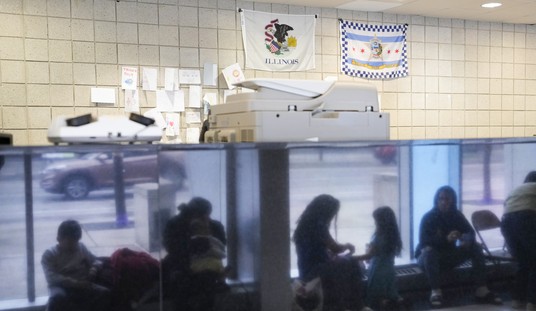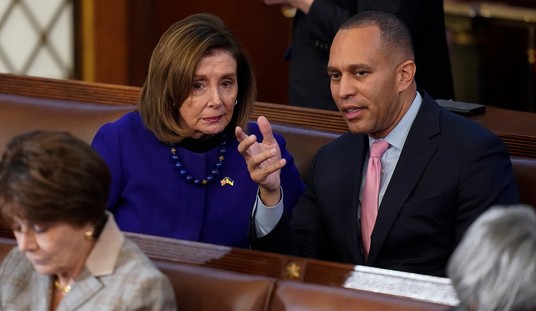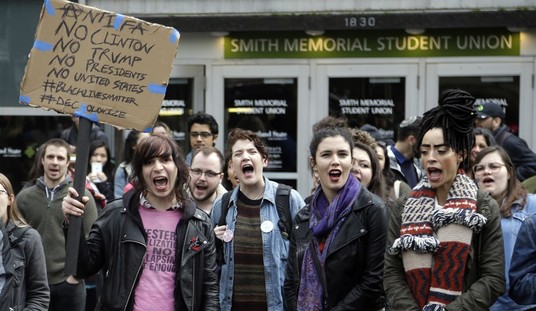China might not want to share its actual data on COVID-19, but they want a share of ours — or so US intelligence and the Trump administration have concluded. The FBI and Homeland Security will issue a public warning later this week accusing China of attempting to hack into research efforts for vaccines and treatments for the novel coronavirus that burst out of Wuhan, the New York Times reports today. The warning may serve as a “shot across the bow” of Beijing as the finding would authorize the use of retaliatory cyberwarfare measures:
The F.B.I. and the Department of Homeland Security are preparing to issue a warning that China’s most skilled hackers and spies are working to steal American research in the crash effort to develop vaccines and treatments for the coronavirus. The efforts are part of a surge in cybertheft and attacks by nations seeking advantage in the pandemic. …
A draft of the forthcoming public warning, which officials say is likely to be issued in the days to come, says China is seeking “valuable intellectual property and public health data through illicit means related to vaccines, treatments and testing.” It focuses on cybertheft and action by “nontraditional actors,” a euphemism for researchers and students the Trump administration says are being activated to steal data from inside academic and private laboratories.
The decision to issue a specific accusation against China’s state-run hacking teams, current and former officials said, is part of a broader deterrent strategy that also involves United States Cyber Command and the National Security Agency. Under legal authorities that President Trump issued nearly two years ago, they have the power to bore deeply into Chinese and other networks to mount proportional counterattacks. This would be similar to their effort 18 months ago to strike at Russian intelligence groups seeking to interfere in the 2018 midterm elections and to put malware in the Russian power grid as a warning to Moscow for its attacks on American utilities.
But it is unclear exactly what the U.S. has done, if anything, to send a similar shot across the bow to the Chinese hacking groups, including those most closely tied to China’s new Strategic Support Force, its equivalent of Cyber Command, the Ministry of State Security and other intelligence units.
That’s a good question, but it’s one that should have been asked years ago. China’s known cyberwarfare stretches back at least as far as the 2013 warning from the Pentagon that China had conducted cyberwarfare against their systems for years. Sure enough, the exposure two years later of their penetration into the Office of Personnel Management proved that point, reinforced as recently as their hack of Equifax. The question about actions taken in retaliation should have been asked at those points rather than at this belated juncture.
Furthermore, the NYT report frames this as an attempt by the White House to shift blame for COVID-19 to China. Apart from the fact that China does own the blame for COVID-19, the years-long cyber campaign from China makes this a particularly dumb argument. China’s track record on intellectual property alone makes this an obvious problem apart from the politics involved, especially after China’s attempt to exploit its access to Remdesivir in initial trials. For those who don’t recall this, China attempted to get a patent on the drug one day after finally disclosing that it knew about the virus’ community-spread potential, which itself raised a lot of questions about just when they knew about it:
It has been revealed that a scientific body in China applied for a commercial patent for Remdesivir, a potential coronavirus treatment, in January, sparking further concerns that the country concealed knowledge about COVID-19 in the early stages of the pandemic.
On January 21, China’s Wuhan Institute of Virology of the Chinese Academy of Sciences and the country’s Military Medicine Institute filed a patent for the commercial use of Remdesivir, a drug developed by US pharmaceutical giant Gilead to treat Ebola, which is currently undergoing clinical trials to determine whether it could work as a COVID-19 treatment.
The patent application came just one day after Beijing confirmed that COVID-19 is transmissible between humans. The speed with which the Wuhan Institute of Virology moved to patent Remdesivir has reinforced suspicions that Chinese authorities may have had a better understanding of the gravity of the pending public health crisis at this early stage than they disclosed to global bodies.
Don’t forget too that China got a lot less interested in Remdesivir when they couldn’t exploit it for their own purposes. They reported that the drug was ineffective in its trials, which were then contradicted by trials in other countries. China has a lot invested in painting itself as a global leader in general, but particularly so in the COVID-19 pandemic in an attempt to bury their own culpability for it. They want to seize and produce any effective treatment for themselves, and then to dole it out for maximum political and strategic benefit.
NPR amplifies the obvious today in its analysis:
In early February, China’s ruling Communist Party was facing one of its biggest political crises in more than three decades. A rapidly spreading outbreak of the new coronavirus was a “massive risk and challenge” to social stability, Chinese leader Xi Jinping warned top party officials in an internal speech that was later published publicly.
But with new domestic infections near zero, China has claimed victory over a virus much of the world is still struggling to curtail. Newly confident and sensitive to criticisms that it initially covered up the outbreak, China’s leadership is now seeking to recast the pandemic as a political win by arguing that its centralized, top-down governance system made it uniquely well-suited for containing and managing the virus; according to official figures, the virus has claimed fewer than 5,000 Chinese lives. …
“One of the most striking elements of Chinese diplomacy at this particular time is just how undiplomatic it’s been,” said Elizabeth Economy, Asia director at the Council on Foreign Relations.
When Australia joined the U.S. in demanding an investigation into the origins of the virus in China, Hu Xijin, the outspoken editor in chief of state tabloid the Global Times, likened Australia to “chewing gum stuck on the sole of China’s shoes. Sometimes you have to find a stone to rub it off.” “You do not know how aggressive, how unreasonable the West can be in making up their fictions,” Hu told NPR.
With all of that as context, China has picked an interesting time to talk trade. They want Trump to make more concessions in the Phase One deal, apparently thinking that they now have leverage to force his hand:
Hawkish voices have emerged in China seeking a reevaluation of its Phase 1 trade deal with the United States, with some advisers urging fresh talks, a state-controlled tabloid said, citing sources close to the Chinese government.
Advisers close to the talks have suggested that Chinese officials revive the possibility of invalidating the trade pact and negotiate a new one to tilt the scales more to the Chinese side, the Global Times reported on Monday, citing the sources.
The Global Times is published by the People’s Daily, the official newspaper of China’s ruling Communist Party. While the Global Times is not an official mouthpiece of the party, its views are believed to reflect those of its leaders at times. …
“The U.S. now cannot afford to restart the trade war with China if everything goes back to the starting point.”
If Beijing really thinks that the US is friendlier to their interests now, they must be getting high on their own supply. Not only are Americans a bit too preoccupied with clean-up over China’s pandemic, their arm-twisting is reminding us of the necessity to control our supply chains for critical use items in the future. Some of that talk is overblown — cheap labor will usually win out over longer-term interests — but China’s making it impossible to rely on those considerations. Trump’s already talking publicly about canceling Phase One from our side of the deal, thanks to China’s reneging on purchases planned in that deal, even without the considerations of the pandemic and China’s propaganda efforts. China is about to talk itself into economic isolation, a destination toward which they accelerated by sending defective medical equipment around the world in this crisis.








